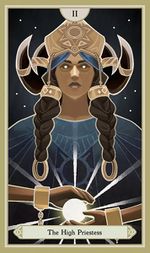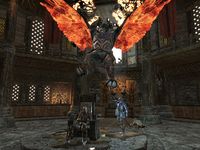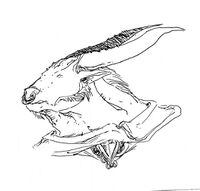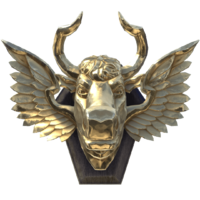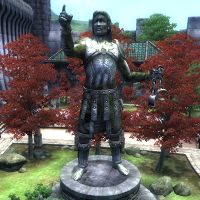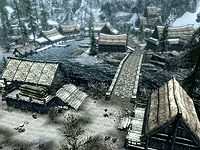Lore:Morihaus
| Morihaus-Breath-of-Kyne | |||
|---|---|---|---|
 Morihaus
Morihaus |
|||
| Race | Demigod (Ada) | Gender | Male |
| Resided in | Cyrod | ||
Morihaus, also known as Morihaus-Breath-of-Kyne[1][2], the First Breath of Man, Winged Bull,[3] Sacred Bull,[4] Bull of the South,[UOL 1] and Taker of the Citadel,[5] was the Demigod[6] of All Winds.[UOL 1] His status as an Ada deity came from his relationship to his mother, the Divine Kyne (or Kynareth).[7] He was the consort of Alessia and father of Belharza.[8] Morihaus was said to be the finest archer of the First Era.[3] He is a figure of great importance and reverence in both Cyrodiil[5] and Skyrim.[9]
Before Kyne departed from Nirn she foresaw many needs coming to the land, and to assist any of those who would carry these needs on their shoulders, she created the Lord's Mail, with the first recipient being her son Morihaus. At some point in time Kyne took the Lord's Mail away from Morihaus due to his arrogance.[10] The artifact is also sometimes called the Armor of Morihaus due to his association with it.[11] The connection with Kyne also granted Morihaus the powers of the thu'um.[5] Similar to his relationship with the Lord's Mail, Morihaus was also aligned with The Lord Constellation.[12]
Nearly every source describes Morihaus as a winged bull, be it a bull-man,[13] man-bull,[7] or the Bull of Kyne.[14] He was capable of flight with his golden wings and had a nose-ring and horns.[1] At some point in time, Morihaus befriended the Demiprince Fa-Nuit-Hen and the two would often drink and dice and even slay beasts that plagued the land together.[6][15]
Alessian Slave Rebellion[edit]
In year 1E 242, Alessia, one of many Nedic slaves, who had become something of the leader among them, helped spark the beginnings of the rebellion against their cruel masters of the Ayleid Empire. She prayed and spoke with the Eight Divines and pleaded with Kyne that next time her son Morihaus flew down, he would join their cause and bring rage against the Ayleids. Kyne granted not only this but alongside the bull was Pelinal Whitestrake a fellow immortal ada. Both arrived to Alessia's camp of rebels with elven blood already spilled by their divine hands and announced to the Nedes that they had killed the eastern chieftains of the Ayleids. Thus formed the trilogy that would seek to simultaneously overthrow and install an Empire.[16] Alessia presented both Pelinal and Morihaus a coronet surmounted with a sword for they were the living weapons of the Empire to come and no mortal could stand before them.[17]
Pelinal preferred to meet the Ayleid kings and chiefs in prearranged open combat, while the Slave-Queen Alessia and Morihaus' tended to the growing armies of the rebellion.[18] When Alessia was seen flying through the skies on the back of the Winged Bull her followers called her Al-Esh (High Highness) for the first time.[19] On one occasion when Morihaus had fallen to a volley of bird beaks, Pelinal carried the bull to a Nede with the Keptu name Zuathas the Clever-Cutting Man.[19] Morihaus and Pelinal had great love and respect for one another, they saw each other as family with Morihaus referring to Pelinal as his uncle and he his nephew. Never did Pelinal council Morihaus in the way of war for the bull fought magnificently, but one rare piece of council was offered by Pelinal in regards to Morihaus' relationship with Alessia, which was growing into that of an intimate love. "We are ada, Mor, and change things through love. We must take care lest we beget more monsters on this earth. If you do not desist, she will take to you, and you will transform all Cyrod if you do this." To which the now shy Morihaus simply responded "She is like this shine on my nose-hoop here: an accident sometimes, but whenever I move my head at night, she is there. And so you know what you ask is impossible."[7]
Pelinal's prophetic warning did indeed pan out as this union gave rise to a new race, the Minotaurs.[8] Belharza the Man-Bull was the first and only known child by name of Alessia and Morihaus.[8]
Against the council of Alessia, Pelinal stormed White-Gold Tower alone in pursuit of his enemy the half Ayleid-half Divine ada Umaril the Unfeathered. After many successful battles against the legion of Daedra and Elves that Umaril sent at Pelinal, Umaril himself confronted the weakened Whitestrake but even he could not beat Pelinal and Umaril too was slaughtered. The few remaining Ayleid kings thereafter descended on the completely depleted Pelinal and cut his body into eighths. Leaving only his head behind for proof of the deed.[20]
Various tapestries and songs depict the next acts taken by Morihaus following the defeat of his beloved friend. The next morning Morihaus rammed the heavily fortified doors of White-Gold Tower so viciously it shook the whole of the tower. Morihaus and his legions then slayed their Wild Elf adversaries in over abundance in honor of Pelinal, taking the tower for control of Alessia in the process. An act that later earned him the title Taker of the Citadel.[21][20][5] Morihaus discovered the severed head of Pelinal in the throne room of White-Gold Tower. The two friends held a final conversation in which Morihaus predicted that his uncle would come again and in a similar light. Pelinal warned that Umaril's spirit survived their encounter and that he could no longer protect mankind from Umaril's retribution.[20][22] The sacrificial defeat of Umaril by Pelinal's hand and the taking of White-Gold by Morihaus and his legions was the effective end of the rebellion. The First Empire of Man was truly born.[5]
Legacy[edit]
Morihaus outlived his beloved wife Alessia and claimed despite her death she was the Lady of Heaven and bathed in stars.[22] The Ruby Throne was succeeded by their son Belharza the Man-Bull.[8] After her death a renowned Ayleid smith named Lirulorne struck a handful of masterwork coins to pay tribute and gave them to Morihaus.[23] All Minotaurs serve as a legacy of Morihaus and while scholars have speculated that them residing around old historical places of significance to the Empire serves as proof of their acknowledgment to their divine ancestry,[8] at least one winged Minotaur directly spoke of his unbroken line and mastery over the land itself.[24] The Adabal-a, one of the oldest written accounts from the First Era, is traditionally believed to be the memoirs of Morihaus. One of its first precepts is "On the Recording of All That Haps", detailing Morihaus' argument with and execution of the Nonscriptionists, a faction against the writing of historic events. This was crucial in documenting the foul practices of the Ayleids so that such information wasn't lost to history and perhaps repeated.[25]
One particular Nordic legend, that dates long past the founding of the First Empire involves the Daedric Prince Mehrunes Dagon manifesting in Skyrim by certain means and stealing the skin of a Nord Clever-Man, he then came upon a young female child known as Aless, named by her father after the slave-queen Alessia. Dagon intended to harm the girl but through the power of god-guiser magic, a regular bull was able to transform into the Winged Bull Morihaus himself. Morihaus protected the young girl and warned Dagon to stand down and turn back. Mehrunes claimed he had no fear of the demigod but upon learning that all of the nearby sons and daughters of Skyrim were descending upon the scene, including the Greybeards who could possibly summon the ghost of Shor, Mehrunes Dagon quickly retreated back to Oblivion.[UOL 1]
Another Nordic legend in the form of a bard song claims that Morihaus haunted the dreams of one Queen Vigdis Stone-Fist.[UOL 2]
While some people consider Morihaus among dead divines,[26] in truth, it is unknown if the demigod lives to this day, or passed on.
Gallery[edit]
Notes[edit]
- The Sermons of Vivec make reference to seven pennants which refer to various Empires. The second pennant commanded a legion of winged bulls and the emperor of color that rode upon each.[27]
- Cherim's Heart of Anequina mentions that the famous artist Cherim created a tapestry depicting Morihaus and his army battling the Ayleids at the White-Gold Tower.
- The statue of Morihaus in the Arena District depicts him as a man.[28] Early descriptions establish him as human,[UOL 3] and the decision to depict him as a bull was only conceptualized later during Knights of the Nine. Due to this inconsistency, Kurt Kuhlmann and Michael Kirkbride joked that the statue would need to be retconned.[UOL 4]
- The Nordic town of Morthal was supposedly named after Morihaus.[9][29]
References[edit]
- ^ a b The Song of Pelinal
- ^ Shezarr and the Divines — Faustillus Junius
- ^ a b Crafting Motif 39: Minotaur Style — Nonus Caprenius, Temporarily Unaffiliated Scholar of Imperial Antiquities
- ^ Remanada
- ^ a b c d e Varieties of Faith... — Brother Mikhael Karkuxor of the Imperial College
- ^ a b Lord Fa-Nuit-Hen and Tutor Riparius Answer Your Questions — Fa-Nuit-Hen and Tutor Riparius
- ^ a b c The Song of Pelinal, v 5
- ^ a b c d e On Minotaurs — Nonus Caprenius, Temporarily Unaffiliated Scholar of Imperial Antiquities
- ^ a b Morthal loading screen
- ^ Lord's Mail quest dialogue in Arena
- ^ Tamrielic Lore — Yagrum Bagarn
- ^ High Astrologer Caecilus Bursio Answers Your Questions — High Astrologer Caecilus Bursio
- ^ The Truth of Minotaurs — Tyronius Liore, Scholar of Imperial Antiquities
- ^ The Prophet's dialogue in Oblivion
- ^ Meet the Character - Fa-Nuit-Hen — Fa-Nuit-Hen
- ^ The Song of Pelinal, v 2
- ^ Star-Made Sword Coronet Major Adornment description in ESO
- ^ The Song of Pelinal, v 3
- ^ a b The Song of Pelinal, v 4
- ^ a b c The Song of Pelinal, v 7
- ^ Cherim's Heart of Anequina — Livillus Perus, Professor at the Imperial University
- ^ a b The Adabal-a — Morihaus
- ^ Al-Esh Ascension Coin item description in ESO
- ^ Domihaus the Bloody-Horned's dialogue in ESO
- ^ The Onus of the Oghma — Phrastus of Elinhir
- ^ Naryu's Journal/Gold Coast — Naryu Virian
- ^ 36 Lessons of Vivec, Sermon 7 — Vivec
- ^ The Elder Scrolls IV: Oblivion Official Game Guide — Peter Olafson
- ^ Morthal Banner Decoration in Blades
Note: The following references are considered to be unofficial sources. They are included to round off this article and may not be authoritative or conclusive.
- ^ a b c The Seven Fights of The Aldudagga
- ^ Skyrim In the New Era — Soren Long-Tooth
- ^ Xanathar's Library Archive/History
- ^ Michael Kirkbride's Posts
|
|||||||||||||||||||||||
|
|||||||||||
